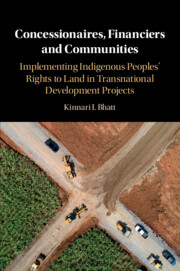 Concessionaires, Financiers and Communities
Concessionaires, Financiers and Communities Project Finance, Power Purchase Agreements and Structural Inequities in Uganda
Published online by Cambridge University Press: 02 March 2020
This chapter provides further context to the impact of project finance mechanisms by examining the Ugandan Bujagali Hydroelectric Power Project referred to in the Preface. This case study is different from the others. It focusses on the interface of contractual and policy instruments with indigenous peoples’ rights to land and then casts the net wider to examine how complex pricing terms and the inequitable negotiation of concessionary power purchase agreements (PPA), in which the government is the end buyer, will have implications for overall vulnerability; for example, by locking governments into an overall bad deal in which all the risk is passed onto the state which has little control over spiralling electricity costs. Thinking about these debt contract–community linkages and what might be done within the context of an important negotiated contract such as the PPA is crucial for two reasons: that of the spread of supposedly cleaner and greener hydroelectric projects worldwide to meet energy demand and the growth of the ‘people first’ trend in public-private partnerships in the quest to mobilise the private sector towards the Sustainable Development Goals.
To save this book to your Kindle, first ensure [email protected] is added to your Approved Personal Document E-mail List under your Personal Document Settings on the Manage Your Content and Devices page of your Amazon account. Then enter the ‘name’ part of your Kindle email address below. Find out more about saving to your Kindle.
Note you can select to save to either the @free.kindle.com or @kindle.com variations. ‘@free.kindle.com’ emails are free but can only be saved to your device when it is connected to wi-fi. ‘@kindle.com’ emails can be delivered even when you are not connected to wi-fi, but note that service fees apply.
Find out more about the Kindle Personal Document Service.
To save content items to your account, please confirm that you agree to abide by our usage policies. If this is the first time you use this feature, you will be asked to authorise Cambridge Core to connect with your account. Find out more about saving content to Dropbox.
To save content items to your account, please confirm that you agree to abide by our usage policies. If this is the first time you use this feature, you will be asked to authorise Cambridge Core to connect with your account. Find out more about saving content to Google Drive.